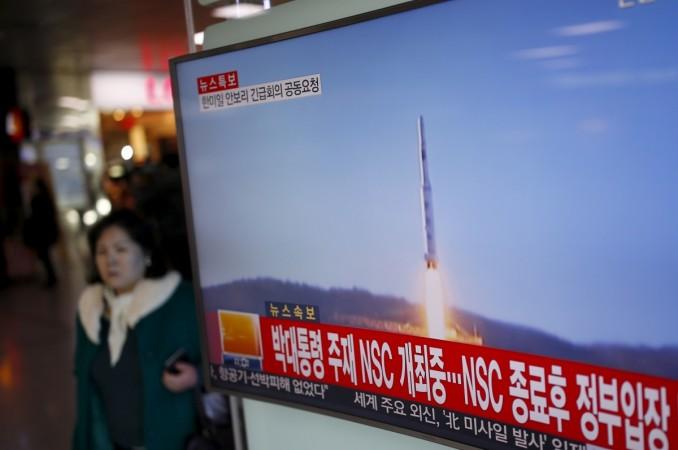
Update: 2:20 p.m.: The United Nations Security Council (UNSC) will on Sunday morning reportedly hold an emergency meeting to discuss the launch of a rocket by North Korea, the UN said.
The meeting will take place at 11 a.m. in New York, according to Reuters. The meeting was called on the request of the United States, Japan and South Korea. These nations see the launch of satellite, as claimed by North Korea, a covert test of ballistic missile technology.
Original Story:
North Korea on Sunday launched a long-range rocket carrying a satellite that has been put into orbit, reports The New York Times citing state-run North Korean TV.
The United States and Japan have claimed otherwise, saying the launch was a covert test of ballistic missile technology North Korea is banned from using under various United Nations sanctions.
Pyongyang launched the rocket at 9:30 a.m. from North Korea's west Coast, and South Korea and US military tracked its flight path. The US Strategic Command said it detected a missile penetrating into space, while South Korean military said North has out an object into orbit.
"At no time was the missile or the resultant debris a threat to the United States or its allies," the US Pacific Command said in a statement.
According the analysis of the launch by Japan, parts of rocket fell 150 km west of the Korean peninsula in the Yellow Sea, southwest of the Korean peninsula in the East China Sea and about 2,000 km south of Japan in the Pacific Ocean, Japanese Prime Minister's office said on Sunday.
Pyongyang had in February notified the UN about its plan to launch a satellite some time between 8 and 25 February. However, on Saturday it announced it would launch the rocket between 7 and 14 February.
The missile North Korea fired on Sunday is said to have a range of over 10,000 km, which could reach the US mainland, Yonhap News Agency reports.
The UN Security Council (UNSC) may hold an emergency meeting on Sunday to discuss the launch as the US, Japan and South Korea requested it, Reuters quoted diplomats as saying.
Launch condemned, seen as provocation
The US, South Korea and Japan condemned the rocket launch, which was in defiance of UN sanctions, calling it a major provocative action.
"This is the second time in just over a month that the DPRK has chosen to conduct a major provocation, threatening not only the security of the Korean peninsula, but that of the region and the United States as well," CNN quoted US Secretary of State John Kerry as saying.
"North Korea's launch using ballistic missile technology, following so closely after its January 6 nuclear test, represents yet another destabilising and provocative action and is a flagrant violation of multiple United Nations Security Council resolutions," said US National Security Adviser Susan Rice.
Calling the launch a "challenge to world peace", South Korean President Park Geun-hye said they "don't know when North Korea is going to do another provocative action, so our government needs to come up with a plan to protect the safety of our people."
Japan lodged a "strong" protest against North Korea through their respective embassies in Beijing, Japanese Chief Cabinet Secretary Yoshihide Suga said. Prime Minister Shinzo Abe, too, criticised the launch
North Korea had attracted international condemnation after its 6 January nuclear test, which it claimed was a miniaturised hydrogen bomb test. However, experts refuted the claims. The UN is considering further sanctions for the January launch, which violated the sanctions of the UNSC.
The UN had imposed sanctions on North Korea when it conducted three nuclear tests at the Punggye-ri site — one in October 2006, another in May 2009 and the last one in February 2013 — for violating its nuclear and missile proliferation sanctions.


!['Kaise ho bhai..': PM Modi shook hands with Akshay Kumar at a media summit in Delhi [Watch] 'Kaise ho bhai..': PM Modi shook hands with Akshay Kumar at a media summit in Delhi [Watch]](https://data1.ibtimes.co.in/en/full/806317/kaise-ho-bhai-pm-modi-shook-hands-akshay-kumar-media-summit-delhi-watch.jpg?w=220&h=135&l=50&t=40)


!['Kaise ho bhai..': PM Modi shook hands with Akshay Kumar at a media summit in Delhi [Watch]](https://data1.ibtimes.co.in/en/full/806317/kaise-ho-bhai-pm-modi-shook-hands-akshay-kumar-media-summit-delhi-watch.jpg?w=220&h=138)
!['Kaise ho bhai..': PM Modi shook hands with Akshay Kumar at a media summit in Delhi [Watch]](https://data1.ibtimes.co.in/en/full/806317/kaise-ho-bhai-pm-modi-shook-hands-akshay-kumar-media-summit-delhi-watch.jpg?w=220&h=135)


